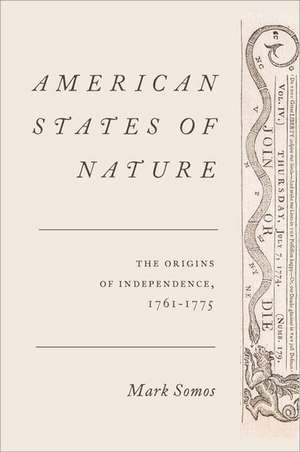American States of Nature: The Origins of Independence, 1761-1775
Autor Mark Somosen Limba Engleză Hardback – 30 mai 2019
Preț: 325.85 lei
Preț vechi: 410.83 lei
-21% Nou
Puncte Express: 489
Preț estimativ în valută:
62.35€ • 65.26$ • 51.90£
62.35€ • 65.26$ • 51.90£
Carte disponibilă
Livrare economică 26 februarie-04 martie
Preluare comenzi: 021 569.72.76
Specificații
ISBN-13: 9780190462857
ISBN-10: 019046285X
Pagini: 424
Ilustrații: 21
Dimensiuni: 236 x 163 x 31 mm
Greutate: 0.68 kg
Editura: Oxford University Press
Colecția OUP USA
Locul publicării:New York, United States
ISBN-10: 019046285X
Pagini: 424
Ilustrații: 21
Dimensiuni: 236 x 163 x 31 mm
Greutate: 0.68 kg
Editura: Oxford University Press
Colecția OUP USA
Locul publicării:New York, United States
Recenzii
the conclusions and methods of this book are a very welcome addition to the vast field of studies concerning the complex process with which American identity and citizenship built itself between the eighteenth and nineteenth century. Going beyond the disciplinary conventions of legal and political history and addressing issues concerning the history of mentality and intellectual history in the broader sense, this book reminds us of the importance of taking account of the role of symbolic discourse, of citizenship-building through education, and literary and popular culture representations to understand one of the most peculiar turns in Western history.
In this thoughtful, fine-grained analysis of eighteenth-century political literature, Somos demonstrates that the term state of nature, widely employed in these texts, led to the creation of a unique American understanding of what constituted the state of nature and its implications for subsequent political debate."—James Muldoon, Professor of History (Emeritus), Rutgers University, The John Carter Brown Library
An invaluable contribution to our understanding of the origins of the American Revolution-Somos' meticulous, closely argued analysis of the development and deployment of distinctively American ideas about the 'state of nature' offers a fresh and illuminating perspective on why patriots ultimately embraced (and loyalists resisted) the break with Britain. This is conceptual history at its very best."—Peter S. Onuf, Thomas Jefferson Foundation Professor of History (Emeritus), University of Virginia
In the vast volume of literature on the American Revolution, Somos' 'American States of Nature' stands out as a provocative and original contribution to its intellectual and legal history. Canvassing sources from the canonical and familiar to the unexpected and neglected, he carefully reconstructs the forgotten history of the 'state of nature' discourse in the American colonies, revealing its significance in the decades culminating in 1776. This painstaking and important work should lead us to revise conventional narratives concerning the Revolution and its relation to American constitutional origins, development, and self-understanding."—David Grewal, Professor of Law, Yale University
Somos' study of the distinctive role of the category of the state of nature in transforming the political awareness and focusing the increasingly revolutionary purposes of America's leaders presents a fundamental challenge to current historiography of the Revolution. It also suggests an original and imaginative approach to capturing the dynamics of revolutionary ideology in the making. It is a book to reckon with."—John Dunn, Professor of Political Theory (Emeritus), University of Cambridge
In this thoughtful, fine-grained analysis of eighteenth-century political literature, Somos demonstrates that the term state of nature, widely employed in these texts, led to the creation of a unique American understanding of what constituted the state of nature and its implications for subsequent political debate."—James Muldoon, Professor of History (Emeritus), Rutgers University, The John Carter Brown Library
An invaluable contribution to our understanding of the origins of the American Revolution-Somos' meticulous, closely argued analysis of the development and deployment of distinctively American ideas about the 'state of nature' offers a fresh and illuminating perspective on why patriots ultimately embraced (and loyalists resisted) the break with Britain. This is conceptual history at its very best."—Peter S. Onuf, Thomas Jefferson Foundation Professor of History (Emeritus), University of Virginia
In the vast volume of literature on the American Revolution, Somos' 'American States of Nature' stands out as a provocative and original contribution to its intellectual and legal history. Canvassing sources from the canonical and familiar to the unexpected and neglected, he carefully reconstructs the forgotten history of the 'state of nature' discourse in the American colonies, revealing its significance in the decades culminating in 1776. This painstaking and important work should lead us to revise conventional narratives concerning the Revolution and its relation to American constitutional origins, development, and self-understanding."—David Grewal, Professor of Law, Yale University
Somos' study of the distinctive role of the category of the state of nature in transforming the political awareness and focusing the increasingly revolutionary purposes of America's leaders presents a fundamental challenge to current historiography of the Revolution. It also suggests an original and imaginative approach to capturing the dynamics of revolutionary ideology in the making. It is a book to reckon with."—John Dunn, Professor of Political Theory (Emeritus), University of Cambridge
Notă biografică
Mark Somos is Alexander von Humboldt Foundation Fellow and Senior Research Affiliate at the Max Planck Institute for Comparative Public Law and International Law, and co-editor-in-chief of Grotiana. He is the author of Secularisation and the Leiden Circle, co-editor (with László Kontler) of Trust and Happiness in the History of European Political Thought, and co-author (with Dániel Margócsy and Stephen Joffe) of The Fabrica of Andreas Vesalius: A Worldwide Descriptive Census, Ownership, and Annotations of the 1543 and 1555 Editions.
